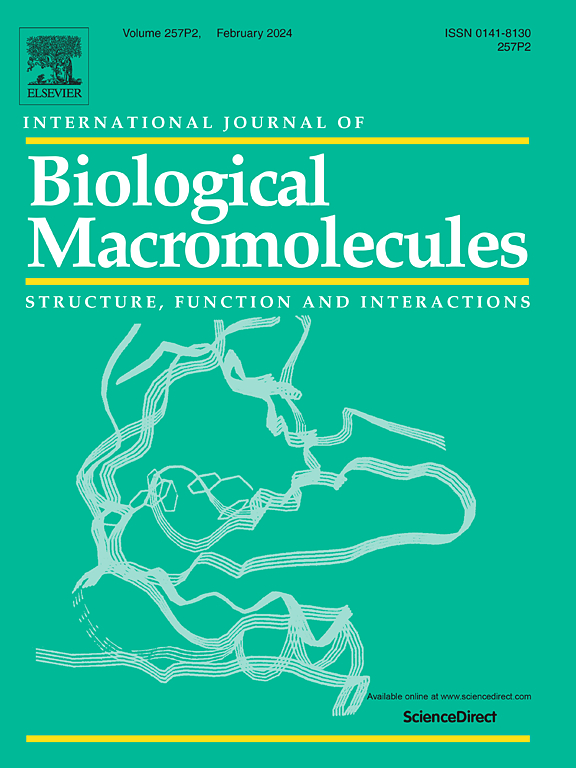三乙醇胺和查尔酮衍生物淀粉薄膜在家禽包装中的耐久性和抗菌性能。
IF 7.7
1区 化学
Q1 BIOCHEMISTRY & MOLECULAR BIOLOGY
International Journal of Biological Macromolecules
Pub Date : 2025-06-01
DOI:10.1016/j.ijbiomac.2025.144627
引用次数: 0
摘要
本研究的重点是使用三乙醇胺(TEA)作为增塑剂来改善淀粉膜的机械和物理性能,同时加入查尔酮衍生物DKO1 ((2E)-1-(5-甲基呋喃-2-基)-3-(4-硝基苯基)prop-2-en-1-one)来提供抗菌活性。4 %的TEA通过促进交联,显著提高了薄膜的机械强度(bbb50 MPa)、微观结构和防潮性能(-1 h-1),从而获得了柔性和持久的包装材料。添加浓度为80 μM的DKO1对食品致病菌伤寒沙门菌和单核增生李斯特菌的抑菌活性增强。该膜还显示出更高的疏水性(53.6γs)和在土壤中的可生物降解性(bbb60 %),提供了一种环保的终寿命选择。dko1负载薄膜有效减少腐败微生物,防止肉类腐败(5分)。这种可食用的生物活性薄膜提供了塑料包装的可持续替代品,比石油基材料的碳足迹更低。本文章由计算机程序翻译,如有差异,请以英文原文为准。
Starch films with triethanolamine and chalcone derivative for improved durability and antimicrobial properties in poultry packaging
This study focuses on the use of Triethanolamine (TEA) as a plasticizer to improve the mechanical and physical properties of starch films, while also incorporating the chalcone derivative, DKO1 ((2E)-1-(5-methylfuran-2-yl)-3-(4-nitrophenyl) prop-2-en-1-one) to provide antimicrobial activity. The addition of TEA at 4 % significantly improved the films' mechanical strength (>5 MPa), microstructure, and moisture barrier (<20 g−1 h−1) properties by promoting cross-linking, resulting in a flexible and long-lasting packaging material. The addition of DKO1 at 80 μM concentration increased antimicrobial activity against food pathogens Salmonella typhi and Listeria monocytogenes. The films also demonstrated increased hydrophobicity (53.6γs) and biodegradability in soil (>60 %), providing an environmentally friendly end-of-life option. DKO1-loaded films effectively reduced spoilage microorganisms and prevented meat spoilage (<8 CFU/g), as evidenced by biochemical and proximate analyses of poultry meat. Biogenic amine quantification revealed a reduction in cadaverine (<15 mg/kg) and putrescine (<90 mg/kg) production in meat stored with DKO1 films, indicating improved preservation. Furthermore, these active films maintained the meat's sensory qualities, which corresponded to consumer preferences (>5 points). This edible and bioactive film offers a sustainable alternative to plastic packaging, with a lower carbon footprint than petroleum-based materials.
求助全文
通过发布文献求助,成功后即可免费获取论文全文。
去求助
来源期刊
CiteScore
13.70
自引率
9.80%
发文量
2728
审稿时长
64 days
期刊介绍:
The International Journal of Biological Macromolecules is a well-established international journal dedicated to research on the chemical and biological aspects of natural macromolecules. Focusing on proteins, macromolecular carbohydrates, glycoproteins, proteoglycans, lignins, biological poly-acids, and nucleic acids, the journal presents the latest findings in molecular structure, properties, biological activities, interactions, modifications, and functional properties. Papers must offer new and novel insights, encompassing related model systems, structural conformational studies, theoretical developments, and analytical techniques. Each paper is required to primarily focus on at least one named biological macromolecule, reflected in the title, abstract, and text.

 求助内容:
求助内容: 应助结果提醒方式:
应助结果提醒方式:


